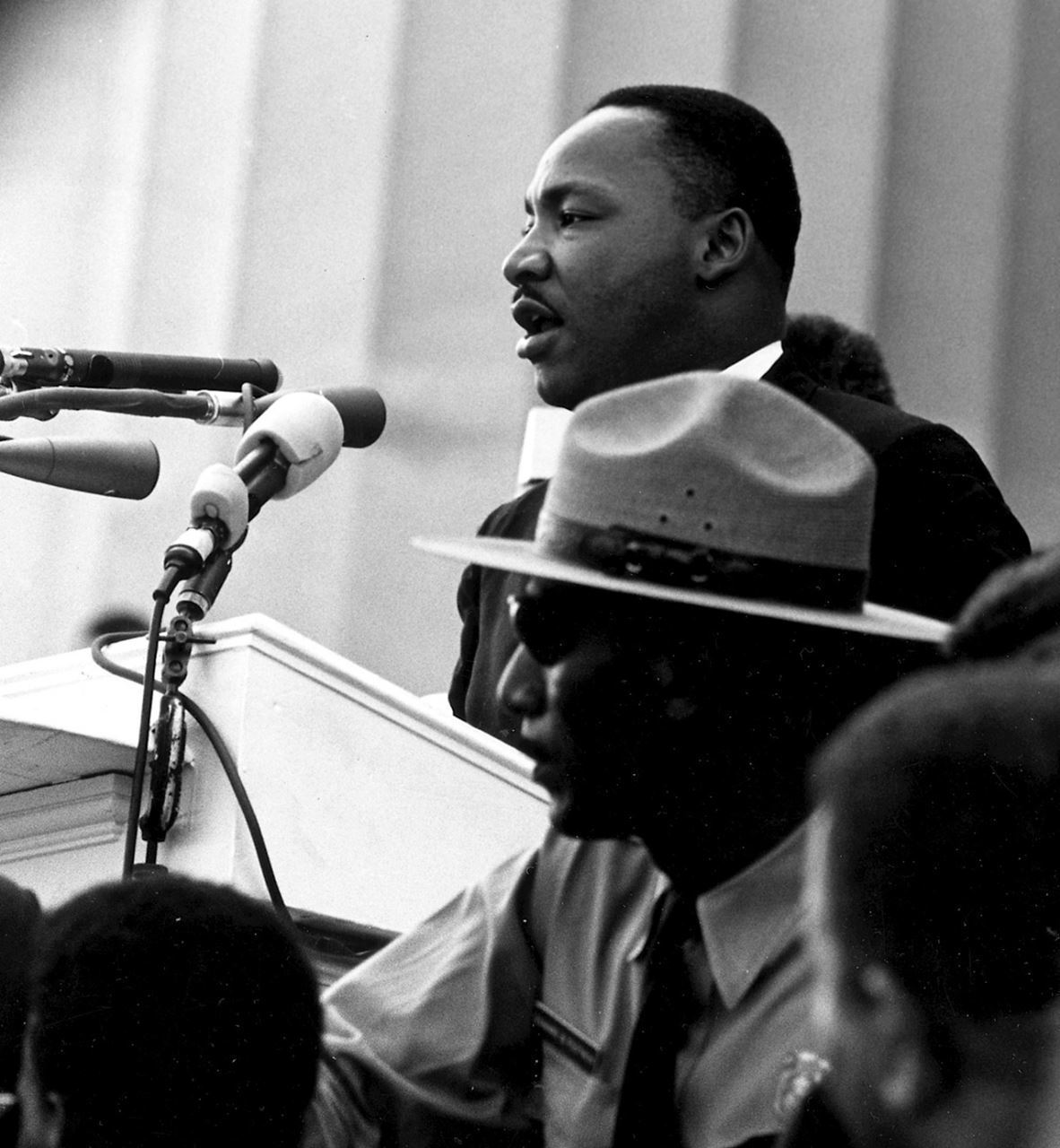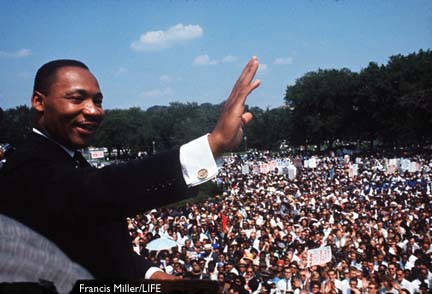 I Have a Dream Speech - Martin Luther KingRowland Scherman [Public domain] via Wikimedia CommonsWhen I was eight years old, I met Martin Luther King Jr. It happened in the heat of the Civil Rights Movement, as Dr. King was bringing his campaign for justice north, to my hometown of Chicago. It would be said, in later years, that Chicago was the only place in America where Martin Luther King learned the meaning of defeat. On one level that's true, but on another level it isn't: No one ever really knows the impact one person has on the life of another. Dr. King may not have done in Chicago all he hoped to do, but he moved and inspired a lot of people during that campaign.
I Have a Dream Speech - Martin Luther KingRowland Scherman [Public domain] via Wikimedia CommonsWhen I was eight years old, I met Martin Luther King Jr. It happened in the heat of the Civil Rights Movement, as Dr. King was bringing his campaign for justice north, to my hometown of Chicago. It would be said, in later years, that Chicago was the only place in America where Martin Luther King learned the meaning of defeat. On one level that's true, but on another level it isn't: No one ever really knows the impact one person has on the life of another. Dr. King may not have done in Chicago all he hoped to do, but he moved and inspired a lot of people during that campaign.
One of those people was me. I was eight, and my brother, Hiawatha, was seven. He was a Cub Scout in the pack that met at St. James Methodist Church, a block from our apartment. It was Brother's involvement in the Cub Scouts that led to my meeting Dr. King. He was to speak at rallies all over Chicago, and one of his scheduled stops turned out to be the parking lot across the street from St. James Church. St. James had been singled out to provide Dr. King with an honor guard of Cub Scouts, and my brother was one of the Scouts selected.
That's how it was that my whole family got to the parking lot on 46th and Ellis earlier than most of the folks in the neighborhood. That's how it was that my brother got to stand on the same stage as Dr. King. My mother and I were standing at the foot of the stage, and I kept playing with the tip of Dr. King's shoe as he talked. That's how close I was to him.
When it was over, and the black town car eased into the lot to pick up Dr. King amid the crowd, I was standing nearby. Before the car drove away, he turned and looked out the window, right into my eyes. He smiled and waved, and so did I. I can still remember that smile, still feel it, though it was more than 35 years ago. Later, Dr. King led a march on downtown Chicago, a march that my whole family attended, dressed in our Sunday clothes. It was my first protest march, though definitely not my last.
My son Allen, now seven, has been asking me about Dr. King for the last couple of years, in part because nearly everyone in his family has a story to tell about him. He knows that his paternal grandparents were local organizers of the March on Washington for Jobs and Freedom. He knows that I wrote a children's biography of Dr. King, which I finished 10 days before Allen's birth and dedicated to my newborn son.
It was important to me to write about Dr. King, not just as a great man, but as an ordinary human being called to do extraordinary things. He was a little boy just like my little boys. He played ball; he argued with his siblings, just as my boys do. His father was a minister, but Dr. King resisted following in his father's footsteps until he was well into college. He sought, as many of us do, to find his own true path. It's important to remember that Martin Luther King was not born a hero but grew into his stature one day at a time.
Someday I also want my sons to know the real Dr. King--that he was not just a nice man who wanted us all to love one another, a romanticized vision that threatens to overtake this annual holiday. Allen and Daniel are still too young to understand the breadth of Dr. King's concerns—his warnings against the Vietnam War that enraged even his supporters; his growing understanding of the plight of the poor, not only in this country, but around the globe, that caused people to question his loyalty to America. But I want my sons to know that to challenge your country when it is wrong, to demand that it become more than it is, is as great an act of patriotism as the bravery of any soldier.
When Allen asks me if he can hear the "I Have a Dream Speech," I can walk to my computer and find the recording online. I can download the audio stream and fill our living room with Dr. King's voice--such is the amazing technology to which we have access. But the voice of this great man may never be more powerful to me than my memory of his voice in a Chicago parking lot. It was his struggle that embodied the struggle of millions of my people, and our descendants, including our sons.
So what will we do on this holiday weekend? Bob and I will tell the children stories of the way things used to be for African-Americans, and sometimes still are. We'll remind them that Dr. King was once a little boy heartbroken and angry to discover that his preschool friendship with a white child ended when first grade began. We'll remind them again that black children and white children could not play together in those days—something Allen periodically brings up as "the stupidest thing I ever heard."
We'll talk, too, about how important God was to Martin Luther King, how he often said it was God who gave him the courage to face frightening people and events. We'll read them stories of the movement that Dr. King embodied, but that did not die with him. And we'll tell Allen and Daniel that the work of freedom never ends, that it will one day be their turn to do their part. For now, they'll imagine superhuman feats of daring. No matter. If we can help our sons know someday that freedom is never free, we'll count ourselves blessed.
Page created on 8/14/2014 11:37:44 PM
Last edited 2/8/2021 7:58:36 AM
 |
| The Rev. Martin Luther King Jr. acknowledges the crowd at the Lincoln Memorial for his "I Have a Dream" speech during the March on Washington, D.C., on Aug. 28, 1963. The march was organized to support proposed civil rights legislation and end segregation. King founded the Southern Christian Leadership Conference in 1957, advocating nonviolent action against America's racial inequality. Awarded the Nobel Peace Prize in 1964, King was assassinated in Memphis, Tenn., in 1968. |

The Rev. Rosemary Bray McNatt is a Unitarian Universalist minister serving the Fourth Universalist Society in New York City. A former editor of "The New York Times Book Review," Rosemary is a widely anthologized writer whose work has appeared in a variety of magazines and newspapers, including The New York Times, Ms., Glamour, Essence, Redbook, and The Village Voice. She is the author of several books, including the biography for children Martin Luther King, a memoir, Unafraid of the Dark, and the forthcoming Beloved One: Prayers for Black Children.
She is a contributing editor to UU World, the magazine of the Unitarian Universalist Association, and chair of the Board of Trustees of Starr King School for the Ministry in Berkeley, Calif., one of the continent’s two Unitarian Universalist seminaries. She and her husband Robert have two young sons.